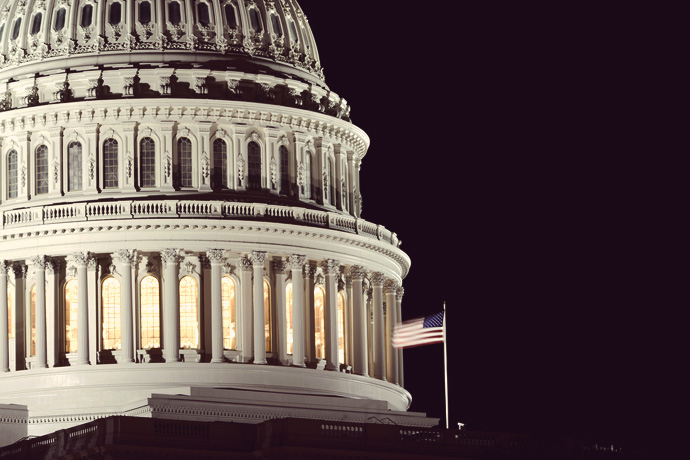Obama Signs STOCK Act Modification, Insider Trading Gets Easier In DC


Oh, Congress, you sneaky little bastards. You think you’ve fooled us again, don’t you? Remember the Stop Trading on Congressional Knowledge (STOCK) Act that easily passed both houses of Congress in March 2012? The bipartisan ban on insider trading by members of Congress was called “the most significant Congressional ethics legislation… adopted in at least five years,” and received only five “no” votes in the House and Senate combined. Crazy, right? Those guys never get along. And it was an election year… very interesting…
The STOCK Act prohibits members of Congress and their immediate family members from trading stocks and other securities based on confidential information received as lawmakers. The law also applies to Congressional aides, judicial employees and thousands of federal agency officials—including many at the White House. And the law doesn’t just outlaw insider trading in the government, it also requires Congressional members and the like to report trades of $1,000 or more within 45 days of transaction, replacing the previous yearly requirement. Those records were to be posted online in a searchable and downloadable format no later than August 2012.
The STOCK Act was signed into law by President Obama in a well-publicized signing ceremony. Obama said the legislation would tackle the “deficit of trust” the public holds with Washington. Sure, during an election year.
Don’t get me wrong, the STOCK Act was a welcome piece of legislation. But those sneaky bastards in Congress knew exactly what they were doing the whole time. See, they needed some good press. The lopsided votes alone showed Congress was desperate to regain voter trust in an election year when its approval rating was below 15 percent. And lawmakers never wanted that little STOCK sucker anyway. It would take away all their fun. So to kill two birds with one stone, they’d pass the sucker, give the voters some warm fuzzies, then gut the whole law after the election. And that’s exactly what they’ve done.
Last week, Congress very quietly passed S. 716, which repealed the requirement that their staffers (and some other employees) disclose their own financial information within 45 days, claiming the mandate posed a “national risk.” Your aides? Mmmmhmmm…
Now the 45-day reporting requirement still applies to the president, vice president, members of and candidates for Congress, as well as some presidentially-nominated and Senate-confirmed government employees. But not their aides. Nice. Oh, and it also delays the creation of the database until next year—the third such extension of a date that was originally set for Aug. 31, 2012.
So let’s review: A law that calls lawmakers and their cronies out on some of their bull shit, but at the same time helps them make save face before an election. Then they gut the thing before they ever let it go into effect. Everybody’s dancing around the idea, I’ll call it straight out: The whole thing was a big fucking conspiracy. And I bet that online database never sees the light of day, either.
Here’s the thing about the online database: It could reveal certain indiscretions that can currently fall between the cracks—or into the basement, as the case may be. Under the present system, the “public” database of lawmakers’ financial disclosure forms is kept in a single office in the basement of Washington’s Cannon House Office Building. By entering your name and address into a computer, you can run a search—but you have to know the name of the person you are searching for. If you find a financial disclosure form, you can print a copy of the pdf for 10 cents per page. And reviewing cases one-by-one can be an enormous task, and completely useless unless for tracking purposes. The online database was supposed to make records for members of Congress, the executive branch AND THEIR STAFF searchable, sortable and downloadable.
So, for example, anyone who had an inkling could easily sort all members of the database who traded health care stock just before a committee acted on health care legislation, it would be simple. Now why on Earth might lawmakers be afraid of such a database?
Well, according to Carol Benosara, president of the Senior Executives Association, many of the 28,000 executive branch staff affected by the Act were concerned about the risks of posting their financial disclosures online. Bonosaro told NPR there were concerns about risks “for those who either travel overseas on government business or work overseas.” And when Obama signed the new legislation Monday, he cited a report from the National Academy of Public Administration that found the online availability of high-ranking government workers financial information needlessly threatened employees’ safety and could make it difficult for agencies to attract and retain talent. OK, we could believe that argument, but here’s what I found out about the National Academy of Public Administration…
The non-profit was founded in 1967 and chartered by Congress “to help public sector leaders meet the important and varied management challenges of today and anticipate those of the future.” According to the organization, it anticipates, evaluates, analyzes and makes recommendations on challenges dealing with public policy, governance, etc. So Congress basically created it to give excuses and make it look better when it acts like a shithead.
There may have been some legitimate security concerns, but instead of addressing them, Congress exiles the records back to the basement. They got us… we’re sure to forget by the next election, right?
And the bill slipped through just a little too easily, a little too slippery. The Senate passed the bill by unanimous consent Thursday, without debate or even a description of the bill. Majority Leader Eric Cantor brought the bill to the House Friday afternoon, and it passed 30 seconds later. Not only was there no debate, many members had already left for the weekend. In passing the bill by unanimous consent the House broke its own promise to give its members three days to read a bill before holding a vote. So basically they all knew the plan to destroy the STOCK Act well in advance. They didn’t need to discuss it because the law was doomed from the start. Such puppeteers, those Congressman.
Think I’m crazy? Really? If lawmakers can be guilty of insider trading in the stock market, aren’t they just as likely to be guilty of the biggest insider trade of them all: Our government? As the old Chinese proverb says, “The most horrible thing is not a government that stages public executions, but a government that secretly disposes of its victims.”









































